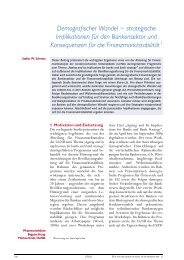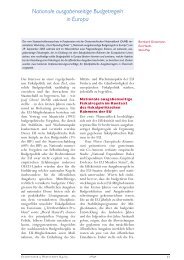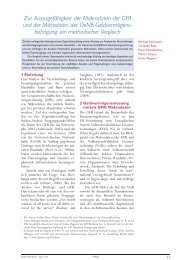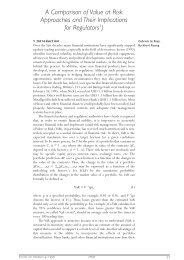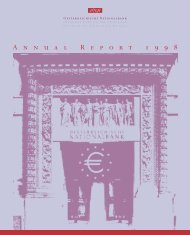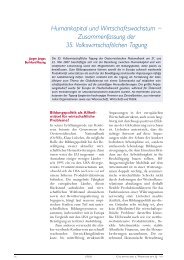You also want an ePaper? Increase the reach of your titles
YUMPU automatically turns print PDFs into web optimized ePapers that Google loves.
exclusively from structural improvements.<br />
Under the stability program,<br />
the tax ratio of 40% of GDP is to<br />
be attained already in 2006.<br />
Along with a new fiscal sharing<br />
scheme for the years 2005 through<br />
2008, a new Austrian stability pact<br />
was adopted to support budget coordination.<br />
Within the framework of<br />
fiscal sharing, further improvements<br />
(aboveallforlocalgovernment)and<br />
simplification measures as well as<br />
the further procedure for the second<br />
stage of the administrative reform<br />
package were agreed. Moreover, the<br />
three levels of government agreed<br />
on introducing additional revenueraising<br />
measures worth 0.12% of<br />
GDP to finance the health care deficit<br />
(posted by the social security and<br />
hospital sectors) and on drawing up<br />
an expenditure cut package of the<br />
same magnitude.<br />
The debt ratio is projected to decline<br />
by 5.1 percentage points from<br />
<strong>2004</strong> and thus fall below the limit<br />
of 60% of GDP by 2008, among<br />
other things thanks to rebounding<br />
primary surpluses and contracting<br />
positive interest rate/growth differentials.<br />
Mid-Term Review —<br />
Further Massive Reforms<br />
RequiredtoImplement<br />
Lisbon Strategy<br />
In <strong>2004</strong>, a high-level group headed by<br />
Wim Kok performed a mid-term<br />
review of the Lisbon strategy, 3 the<br />
reform program aimed at making<br />
Europe the most dynamic and competitive<br />
knowledge-based economy<br />
in the world. The strategy defines<br />
employment, research, internal market,<br />
environmental sustainability and<br />
social goals to be reached by 2010.<br />
The Kok report 4 criticizes the disappointing<br />
delivery of the Lisbon goals<br />
of growth and employment. While<br />
some progress was observable and<br />
EuropeÕs social model had a much<br />
better record than its U.S. counterpart<br />
in important areas (poverty, infant<br />
mortality rates, life expectancy),<br />
productivity growth in Europe had<br />
declined and so far, the political will<br />
to implement reforms was lacking.<br />
Overall, there was little improvement<br />
in many areas, such as employment<br />
or research. Some areas in<br />
some countries represented exceptions,<br />
e.g. achievements toward the<br />
knowledge society in Finland and<br />
Sweden, the reduction of unemployment<br />
in Italy and productivity gains<br />
in Ireland. The unfavorable framework<br />
conditions of economic stagnation<br />
and global political uncertainty<br />
represented obstacles to reaching<br />
the Lisbon goals. Moreover, the EUÕs<br />
focus was on enlargement and the<br />
Constitution for Europe.<br />
The EU scored some progress in<br />
reaching the employment rate target<br />
of 70%. Despite economic stagnation,<br />
Italy succeeded in lowering<br />
unemployment from nearly 12% to<br />
8%; the employment rate for Europe<br />
as a whole advanced by 1 percentage<br />
point to just under 65% from 2000.<br />
Liberalization has made strides in<br />
most European network industries,<br />
such as telecommunications, energy<br />
(gas and electricity), the postal serv-<br />
3 The 32 nd Economics Conference of the OeNB on May 27 and 28, <strong>2004</strong>, also dealt with this topic: ÒGrowth and<br />
Stability in the EU: Perspectives from the Lisbon Agenda.Ó (The conference proceedings may be found on the<br />
OeNBÕs website at www.oenb.at.)<br />
4 See: Facing the challenge. The Lisbon strategy for growth and employment. <strong>Report</strong> from the High Level Group<br />
chaired by Wim Kok. Luxembourg: Office for Official Publications of the European Communities. November<br />
<strong>2004</strong>.<br />
The Eurosystem Secures Price Stability<br />
Kok <strong>Report</strong> is critical<br />
Progress in employment,<br />
network industries<br />
and financial<br />
services<br />
<strong>Annual</strong> <strong>Report</strong> <strong>2004</strong> ×<br />
31



